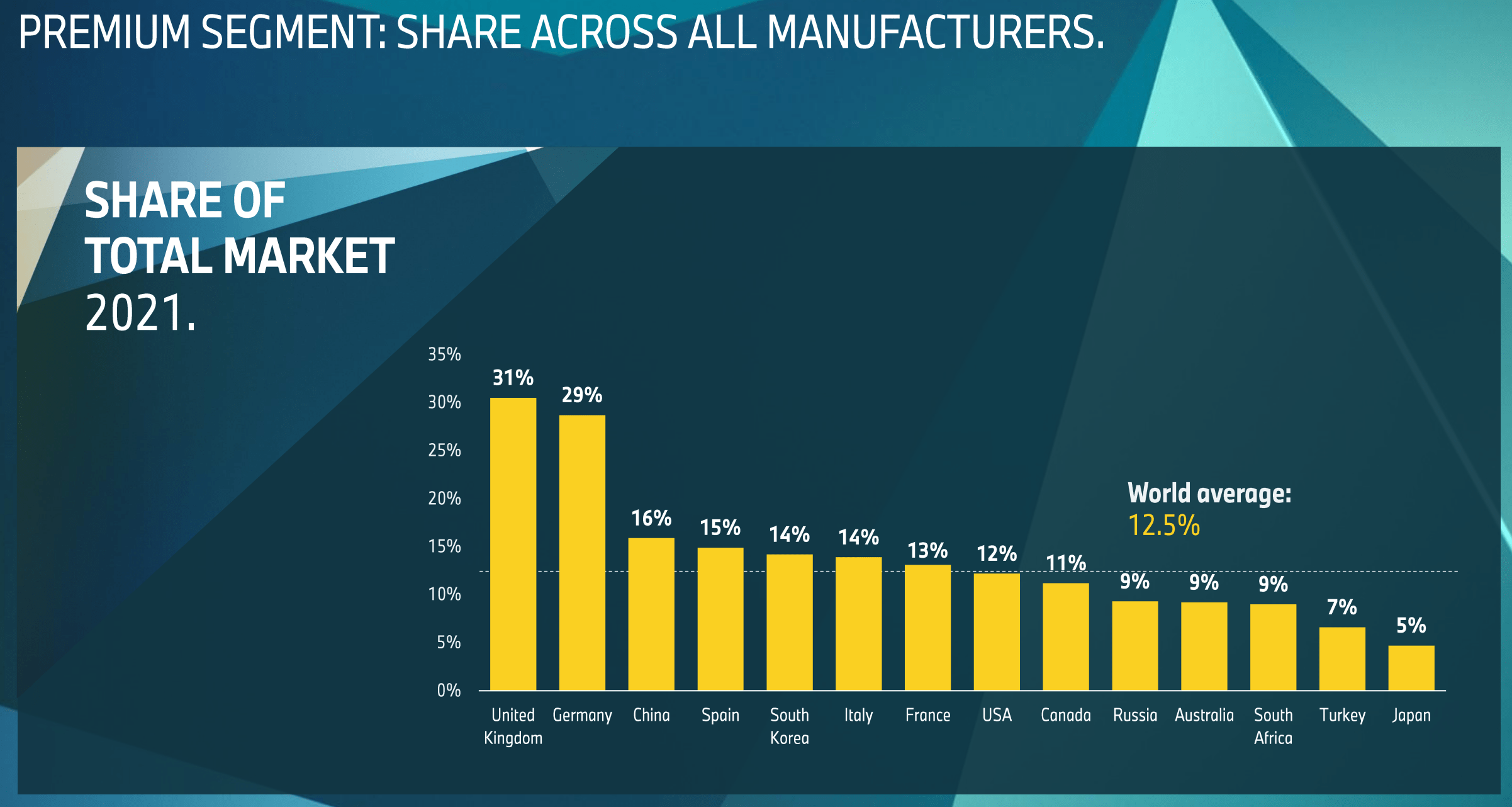Analyzing The Chinese Market: Why BMW And Porsche Face Headwinds

Table of Contents
Intensifying Domestic Competition
The rise of domestic Chinese automakers presents a significant challenge to established luxury brands. This intensified competition is multifaceted, stemming from both the emergence of strong domestic luxury brands and the increasing prevalence of joint ventures.
Rise of Chinese Luxury Brands
The impressive growth of Chinese electric vehicle (EV) manufacturers like Nio, Xpeng, and Li Auto is dramatically reshaping the luxury car landscape.
- Comparable Technology and Lower Prices: These brands offer electric vehicles with comparable technology and features to their German counterparts, often at significantly lower price points. This price competitiveness is a major draw for Chinese consumers.
- Targeting Young, Tech-Savvy Consumers: Chinese luxury EV brands are effectively targeting younger generations who are highly digitally engaged and prioritize technological innovation. Their marketing strategies resonate strongly with this demographic.
- Government Support and Subsidies: Government support and subsidies for domestic EV manufacturers provide a substantial competitive advantage, further bolstering their market position. This financial backing allows for aggressive pricing strategies and rapid technological development.
Joint Ventures and Local Partnerships
International brands are increasingly forming joint ventures and partnerships with Chinese automakers. While offering access to the local market, these collaborations often come with trade-offs.
- Sharing Technology and Intellectual Property: Joint ventures frequently involve sharing valuable technology and intellectual property, potentially diluting the unique advantages of the foreign brand.
- Regulatory and Operational Challenges: Navigating the complex regulatory environment and managing local partnerships adds significant operational challenges and administrative burdens. This can hinder efficiency and profitability.
Shifting Consumer Preferences
The Chinese automotive market is experiencing a rapid shift in consumer preferences, driven by technological advancements and evolving brand perceptions.
Electrification and Technological Advancements
Chinese consumers are quickly adopting electric vehicles and demanding advanced driver-assistance systems (ADAS). This trend presents both opportunities and challenges for established luxury brands.
- Lagging in EV Perception: BMW and Porsche, while investing in EVs, may not be perceived as early movers or innovators in the rapidly expanding Chinese EV market. Their reputation for internal combustion engine (ICE) vehicles may not translate seamlessly to the electric vehicle sector.
- Demand for Cutting-Edge Technology: Chinese consumers are exceptionally attuned to the latest technological advancements, demanding vehicles equipped with the most innovative features and connectivity options. This necessitates significant R&D investment and rapid product adaptation.
Brand Perception and Marketing Strategies
Adapting marketing strategies to resonate with evolving Chinese consumer preferences is critical for success.
- Nuances of Chinese Digital Marketing: Luxury brands need a sophisticated understanding of Chinese social media platforms like WeChat and Weibo, as well as effective digital marketing strategies tailored to the local market.
- Building Brand Loyalty and Trust: Building strong brand loyalty and trust in a highly competitive landscape is paramount, requiring targeted marketing campaigns and a focus on customer experience.
Economic and Geopolitical Factors
Macroeconomic conditions and geopolitical tensions significantly influence the Chinese automotive market, impacting consumer spending and business operations.
Economic Slowdown
China's economic growth has moderated in recent years, impacting luxury goods consumption.
- Impact on Luxury Car Sales: This economic slowdown translates to reduced consumer spending on discretionary items like premium automobiles, directly affecting sales forecasts for luxury brands.
- Increasing Price Sensitivity: Economic uncertainty increases price sensitivity among consumers, requiring luxury brands to carefully consider pricing strategies and product offerings.
Geopolitical Tensions
Rising geopolitical tensions between China and the West create an unpredictable environment for foreign businesses.
- Unstable Business Environment: Trade disputes and political uncertainty contribute to an unstable operating environment, making long-term planning and investment decisions more challenging.
- Supply Chain Disruptions and Tariffs: Geopolitical tensions can disrupt supply chains and lead to increased tariffs, adding to operational complexities and costs.
Conclusion
Analyzing the Chinese market reveals significant headwinds for BMW and Porsche. Intensifying domestic competition from innovative Chinese brands, shifting consumer preferences towards electrification and advanced technology, and challenging economic and geopolitical factors necessitate a strategic reassessment. Successfully navigating this complex landscape demands a deeper understanding of the Chinese consumer, a commitment to technological leadership in the EV sector, and agile, adaptable marketing strategies. To maintain and expand their market share, these luxury brands must actively analyze the Chinese market and implement dynamic strategies to overcome these challenges. Failure to adapt could significantly impact their future success in this crucial market. Continued analysis of the Chinese market is essential for future success.

Featured Posts
-
 Stranger Things 5 Teaser Trailer Netflix Release Date Speculation
May 29, 2025
Stranger Things 5 Teaser Trailer Netflix Release Date Speculation
May 29, 2025 -
 Teenagers Arrested For Attack On 16 Year Old Hate Crime Allegations
May 29, 2025
Teenagers Arrested For Attack On 16 Year Old Hate Crime Allegations
May 29, 2025 -
 Anton Mena On Vinicius Jr And Mbappe A Real Madrid Brotherhood
May 29, 2025
Anton Mena On Vinicius Jr And Mbappe A Real Madrid Brotherhood
May 29, 2025 -
 Icc Prosecutor Prepared Arrest Warrants For Israeli Far Right Politicians Exclusive
May 29, 2025
Icc Prosecutor Prepared Arrest Warrants For Israeli Far Right Politicians Exclusive
May 29, 2025 -
 A Comprehensive Guide To The Countrys Emerging Business Centers
May 29, 2025
A Comprehensive Guide To The Countrys Emerging Business Centers
May 29, 2025
Latest Posts
-
 Boxing Controversy Munguias Positive Test And Suraces Protest
May 31, 2025
Boxing Controversy Munguias Positive Test And Suraces Protest
May 31, 2025 -
 Munguia Surace Rematch A Look At The Boxing Results And Munguias Performance
May 31, 2025
Munguia Surace Rematch A Look At The Boxing Results And Munguias Performance
May 31, 2025 -
 Munguia Fails Drug Test Surace Calls For Fight Result Reversal
May 31, 2025
Munguia Fails Drug Test Surace Calls For Fight Result Reversal
May 31, 2025 -
 Boxing Munguia Dominates Surace In Rematch Despite Limited Improvement
May 31, 2025
Boxing Munguia Dominates Surace In Rematch Despite Limited Improvement
May 31, 2025 -
 Munguias Positive Testosterone Test Surace Demands Win Overturned
May 31, 2025
Munguias Positive Testosterone Test Surace Demands Win Overturned
May 31, 2025
